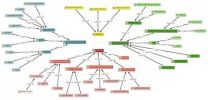(Press-News.org) VIDEO:
Research findings show the important role civilian life and the accompanying stress plays in cases of alcohol use disorder among returning National Guardsmen.
Click here for more information.
Regardless of traumatic events experienced during deployment, returning National Guard soldiers were more likely to develop a drinking problem if faced with civilian life setbacks, including job loss, legal problems, divorce, and serious financial and legal problems—all commonplace in military families. Results of the study by researchers at Columbia University's Mailman School of Public Health are published online in the American Journal of Preventive Medicine.
Alcohol abuse is a major concern for reservists returning home. Nearly 7% of Americans abuse or are dependent on alcohol, but among reserve soldiers returning from deployment, the rate of alcohol abuse is 14%, almost double that of the civilian population.
The study looked at a group of 1,095 Ohio National Guard soldiers who had primarily served in either Iraq or Afghanistan in 2008 and 2009. Over three years, the soldiers were interviewed three times via telephone and were asked about their alcohol use, exposure to deployment-related traumatic events and stressors like land mines, vehicle crashes, taking enemy fire, and witnessing casualties, and any stress related to everyday life since returning from duty.
More than half (60%) of the responding soldiers experienced combat-related trauma, 36% of soldiers experience civilian stressors, and 17% reported being sexually harassed during their most recent deployment. Among the group, 13% reported problems consistent with an alcohol use disorder in the first interview, 7% during the second, and 5% during the third. Alcohol use disorder is defined as alcohol abuse or dependence.
The researchers found having at least one civilian stressor or a reported incident of sexual harassment during deployment raised the odds of alcohol use disorders. The effect of the stressors was restricted to cases of new-onset alcohol use disorders, and wasn't seen among those with a history of problem drinking. In contrast, combat-related traumatic events were only marginally associated with alcohol problems.
The study highlights the important role civilian life and the accompanying stress plays in cases of alcohol use disorder in the National Guard.
"Exposure to the traumatic event itself has an important effect on mental health in the short-term, but what defines long-term mental health problems is having to deal with a lot of daily life difficulties that arise in the aftermath—when soldiers come home," explains lead investigator Magdalena Cerdá, DrPH, MPH, assistant professor of Epidemiology at the Mailman School of Public Health. "The more traumatic events soldiers are exposed to during and after combat, the more problems they are likely to have in their daily life—in their relationships, in their jobs—when they come home. These problems can in turn aggravate mental health issues, such as problems with alcohol, that arise during and after deployment."
With high rates of alcohol abuse among soldiers, there is a critical need for targeted interventions to help soldiers handle stressful life events without alcohol, the investigators observe. More than 1.6 million service members have been deployed in support of war efforts Operation Enduring Freedom, Operation Iraqi Freedom, and Operation New Dawn.
"Guardsmen who return home need help finding jobs, rebuilding their marriages and families, and reintegrating into their communities," says Karestan Koenen, PhD, professor of Epidemiology at the Mailman School and senior author of the study. "Too many of our warriors fall through the cracks in our system when they return home. This is particularly true of Guardsmen who do not have the same access to services as regular military personnel. We need to support our soldiers on the home front just as we do in the war zone."
INFORMATION:
The findings from this study are consistent with two reports the Institute of Medicine released this year, which call attention to the serious mental health issues faced by the military population upon return from Iraq and Afghanistan, and highlight the need for the Department of Defense to develop an evidence base on the effectiveness of prevention and treatment programs targeted at service members and their families. A co-author of the current study, Sandro Galea, MD, DrPH, chair of Epidemiology at the Mailman School, led the Commission that issued one of the reports; Dr. Koenen was a co-author of the same.
Design of the original study, data collection, management and analysis were supported by grants from the Department of Defense: W81XWH-07-1-0409, W81XWH-08-2-0650, and W81XWH-08-2-0204, as well as a grant from the National Institute of Mental Health: MH 082729. Analysis and interpretation of the data, as well as preparation, review and approval of the manuscript were supported by a grant from the National Institute on Drug Abuse: DA030449 and a grant from the National Institute on Mental Health: MH093612.
About Columbia University's Mailman School of Public Health
Founded in 1922, Columbia University's Mailman School of Public Health pursues an agenda of research, education, and service to address the critical and complex public health issues affecting New Yorkers, the nation and the world. The Mailman School is the third largest recipient of NIH grants among schools of public health. Its over 450 multi-disciplinary faculty members work in more than 100 countries around the world, addressing such issues as preventing infectious and chronic diseases, environmental health, maternal and child health, health policy, climate change & health, and public health preparedness. It is a leader in public health education with over 1,300 graduate students from more than 40 nations pursuing a variety of master's and doctoral degree programs. The Mailman School is also home to numerous world-renowned research centers including ICAP (formerly the International Center for AIDS Care and Treatment Programs) and the Center for Infection and Immunity. For more information, please visit http://www.mailman.columbia.edu
Vets' alcohol problems linked to stress on the home front
Returning National Guardsmen more likely to turn to alcohol than the general public when faced with issues at home
2014-07-31
ELSE PRESS RELEASES FROM THIS DATE:
Veterans' alcohol problems linked to stress on the home front
2014-07-31
Ann Arbor, MI, July 31, 2014 — Regardless of traumatic events experienced during deployment, returning National Guard soldiers were more likely to develop a drinking problem if faced with civilian life setbacks, including job loss, legal problems, divorce, and serious financial and legal problems — all commonplace in military families. Results of the study by researchers at Columbia University's Mailman School of Public Health are published online in the American Journal of Preventive Medicine.
Alcohol abuse is a major concern for reservists returning home. Nearly 7% ...
Research proves there is power in numbers to reduce electricity bills
2014-07-31
Consumers can save money on their electricity bills and negotiate better deals by joining forces with similar groups of customers to switch energy suppliers according to new research.
Collective switching or group buying schemes, where thousands of consumers join forces to negotiate cheaper electricity tariffs, are becoming more popular in the UK as bills continue to rise putting increasing pressure on household budgets. Initiatives like Which?'s Big Switch, People Power or the Big Deal have helped thousands of consumers to save, on average, up to a third of their yearly ...
Engineering a protein to prevent brain damage from toxic agents
2014-07-31
Research at New York University is paving the way for a breakthrough that may prevent brain damage in civilians and military troops exposed to poisonous chemicals—particularly those in pesticides and chemical weapons.
An article in the current issue of the journal ChemBioChem outlines the advancement in detoxifying organophosphates, which are compounds commonly used in pesticides and warfare agents. The patent-pending process was developed by NYU School of Engineering Associate Professor of Chemical and Biological Engineering Jin Kim Montclare, along with Richard Bonneau, ...
Transplantation shown to be highly effective in treating immune deficiency in children
2014-07-31
Babies who are born with severe combined immunodeficiency (SCID) can be successfully treated with a transplant of blood-forming stem cells, according to experts led by Memorial Sloan Kettering's Richard J. O'Reilly, MD, a world-renowned pioneer in the development of transplant protocols. Their review will be published in the July 30 issue of the New England Journal of Medicine.
SCID is a group of inherited disorders that cause the immune system to severely malfunction. When this breakdown occurs, babies no longer have the ability to fight off routine infections because ...
Journal supplement details progress in African medical education
2014-07-31
Medical education in sub-Saharan Africa is being revitalized and expanded through a U.S.-funded effort that is dramatically increasing enrollment, broadening curricula, upgrading Internet access and providing cutting-edge skills labs and other technologies.
In the first substantial publication by participants of the $130 million Medical Education Partnership Initiative (MEPI), more than 225 authors detailed progress being made at the African institutions. Their reports are in a supplement being published today by the journal Academic Medicine. Begun in 2010, MEPI is ...
Resistance to key malaria drug spreading at alarming rate in Southeast Asia
2014-07-31
WHAT:
Resistance to artemisinin, the main drug to treat malaria, is now widespread throughout Southeast Asia, among the Plasmodium falciparum (P. falciparum) parasites that cause the disease and is likely caused by a genetic mutation in the parasites. However, a six-day course of artemisinin-based combination therapy—as opposed to a standard three-day course—has proved highly effective in treating drug-resistant malaria cases, according to findings published today in the New England Journal of Medicine. The research was conducted by an international team of scientists ...
Biologists describe mechanism promoting multiple DNA mutations
2014-07-30
DNA mutations—long known to fuel cancer as well as evolutionary changes in a living organism—had been thought to be rare events that occur randomly throughout the genome.
However, recent studies have shown that cancer development frequently involves the formation of multiple mutations that arise simultaneously and in close proximity to each other. These groups of clustered mutations are frequently found in regions where chromosomal rearrangements take place.
The discovery, published in the journal Cell Reports, may one day lead to new cancer therapies, according to ...
Classic Lewis Carroll character inspires new ecological model
2014-07-30
Inspired by the Red Queen in Lewis Carroll's Through the Looking Glass, collaborators from the University of Illinois and National University of Singapore improved a 35-year-old ecology model to better understand how species evolve over decades to millions of years.
The new model, called a mean field model for competition, incorporates the "Red Queen Effect," an evolutionary hypothesis introduced by Lee Van Valen in the 1970s, which suggests that organisms must constantly increase their fitness (or ability to survive and reproduce) in order to compete with other ever-evolving ...
Diverticulitis patients reveal psychological, physical symptoms long after acute attacks
2014-07-30
UCLA researchers interviewed people with diverticulitis and confirmed that many suffer psychological and physical symptoms long after their acute illness has passed.
For the study, published this week in the peer-reviewed journal Quality of Life Research, a UCLA team led by Dr. Brennan Spiegel interviewed patients in great detail about the symptoms they experience weeks, months or even years after an acute diverticulitis attack. Their striking findings add to growing evidence that, for some patients, diverticulitis goes beyond isolated attacks and can lead to a chronic ...
Finding quantum lines of desire
2014-07-30
Groundskeepers and landscapers hate them, but there is no fighting them. Called desire paths, social trails or goat tracks, they are the unofficial shortcuts people create between two locations when the purpose-built path doesn't take them where they want to go.
There's a similar concept in classical physics called the "path of least action." If you throw a softball to a friend, the ball traces a parabola through space. It doesn't follow a serpentine path or loop the loop because those paths have higher "actions" than the true path.
But what paths do quantum particles, ...
LAST 30 PRESS RELEASES:
New statewide research reveals the staggering economic cost of intimate partner violence in Louisiana
From ashes to adversity: Lessons from South Australia's business recovery amidst bushfires and pandemic
Multiple pollutants from crop and livestock production in the Yangtze River: status and challenges
Unraveling the unique role of DELLA proteins in grapevine flowering: A shift in developmental fate
Next-generation treatments hitch a ride into cancer cells
Unraveling the role of DlBGAL9 and AGL61/80 in Longan somatic embryogenesis and heat stress tolerance: A multi-omics approach
Decoding pecan pollination: A dive into the chloroplast genome of 'Xinxuan-4' and its impact on cultivar diversity and efficiency
KD-crowd: A knowledge distillation framework for learning from crowds
Can animals count?
Australian media need generative AI policies to help navigate misinformation and disinformation
Illuminating the path to hearing recovery
Unlocking the secrets of fruit quality: How anthocyanins and acidity shape consumer preferences and market value
Evidence for reversible oxygen ion movement during electrical pulsing: enabler of the emerging ferroelectricity in binary oxides
Revolutionizing Citrus cultivation: The superior tolerance and growth vigor of 'Shuzhen No.1' rootstock
Family and media pressure to lose weight in adolescence linked to how people value themselves almost two decades later
Despite the desire to reduce the risk of imitation, new research suggests startups should scale slowly and steadily
The Lancet: Many people with breast cancer ‘systematically left behind’ due to inaction on inequities and hidden suffering
From opioid overdose to treatment initiation: outcomes associated with peer support in emergency departments
NIH awards $3.4 million to Wayne State University to investigate biomarkers for better reproductive success
New study shows corporate misconduct at home hurts sales overseas
Take it from the rats: A junk food diet can cause long-term damage to adolescent brains
Fralin Biomedical Research Institute team unpacking genetic mysteries of childhood epilepsies
UNC-Chapel Hill researchers discover new clues to how tardigrades can survive intense radiation
UT Arlington prioritizes entrepreneurship efforts
Ochsner Health receives 2024 Top Workplaces Culture Excellence Awards
Are these newly found rare cells a missing link in color perception?
Annals supplement highlights important new evidence readers ‘may have missed’ in 2023
NIH awards $2.3 million grant to University of Oklahoma for gene therapy research
Hidden threat: Global underground infrastructure vulnerable to sea-level rise
Study reveals AI enhances physician-patient communication
[Press-News.org] Vets' alcohol problems linked to stress on the home frontReturning National Guardsmen more likely to turn to alcohol than the general public when faced with issues at home





